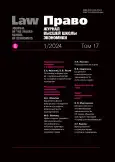Belarusian Experience of Systematization of Legislation on Protecting Cultural Heritage through Codification
- Authors: Martynenka I.1
-
Affiliations:
- Grodno Yanka Kupala State University, 22 Eliza Ozheshko Str.
- Issue: Vol 17, No 1 (2024)
- Pages: 190-212
- Section: Law in the Modern World
- URL: https://bakhtiniada.ru/2072-8166/article/view/296435
- DOI: https://doi.org/10.17323/2072-8166.2024.1.190.212
- ID: 296435
Cite item
Full Text
Abstract
The purpose of the article is to familiarize the legal community with the first experience of codification of legislation on culture and the practice of its application. This article discusses the features of reforming legislation on the protection of cultural heritage objects through its codification. The author, based on an analysis of the provisions of the Code of the Republic of Belarus on Culture, introduced in 2017, taking into account the constitutional changes made in 2022–2023, demonstrates the advantages and disadvantages of codification in this area of legislation. It is proved that the codification of legislation on culture made it possible to streamline numerous regulatory legal acts in force in the field of cultural (historical and cultural) heritage, the implementation of museum, library and urban planning activities aimed at the preservation and use of cultural heritage objects. The novelties of the regulation of ownership of cultural heritage objects, including archaeological monuments, archaeological artifacts, treasures, as well as the forced termination of ownership through judicial seizure of mismanaged monuments are outlined. Examples are given of solving the problem of financing the cultural heritage sector through the use of new tools (patrons and sponsors, public-private partnerships). Some attention is paid to the judicial protection of cultural heritage objects (historical and cultural values), a new solution to which is proposed in the Code of Culture. The article formulates some proposals to clarify the legal status of immovable monuments and movable cultural values, and provides a classification of tangible and intangible historical and cultural values by type. The structure of the State List of Historical and Cultural Values and the specifics of its maintenance from January 1, 2023 are outlined. Dynamic statistical data concretizes the research material and improves its perception. The author defends the idea that the adoption of the Code of Culture created the preconditions for the formation of a fundamentally new approach to state protection, recording and use of ancient monuments and art in modern life. And in this regard, the Belarusian experience of codifying legislation on culture can be useful.
About the authors
I. Martynenka
Grodno Yanka Kupala State University, 22 Eliza Ozheshko Str.
Email: i.martinenko@grsu.by
Grodno 230023, Republic of Belarus
References
- Bartkova O.G. (2022) Relationship of the category “culture” and the basic concepts in the field of legal regulation of cultural activities with individual institutions of civil law. Vestnik Tverskogo gosudarstvennogo universiteta=Bulletin of Tver State University, no. 3, pp. 7-14 (in Russ.)
- Bistrova O.A. (2016) The essence and content of public administration and regulation in the sphere of culture. Kultura: upravlenie, ekonomika, pravo=Culture: Management, Economics, Law, no. 1, pp. 29-33 (in Russ.)
- Goloviznin A.V. (2019) Security obligations as encumbrances imposed on owners of cultural heritage objects. Kultura: upravlenie, ekonomika, pravo=Culture: Management, Economics, Law, no. 3, pp. 29-35 (in Russ.)
- Goloviznin A.V. (2022) Social and legal aspects of investing in cultural heritage objects (Sverdlovsk area case). In: Financial and legal aspects of socially oriented investment: papers of All-Russian conference. Yekaterinburg: Ural State University of Economics, pp. 159-163 (in Russ.)
- Ivanova Zh.B. (2020) Irreparable losses of cultural heritage: on the issue of the effectiveness of protective obligations. Kultura: upravlenie, ekonomika, pravo=Culture: Management, Economics, Law, no. 3, pp. 36-40 (in Russ.)
- Klebanov L.R. (2020) Art market: aspects of legal regulation. Moscow: Norma, 232 p. (in Russ.)
- Kuzina S.V. (2017) Novellas in the field of historical and cultural monuments protection. Vestnik Saratovskoi yuridicheskoi akademii=Bulletin of Saratov State Law Academy, no. 4, pp. 135-139 (in Russ.)
- Kulikova S.A. (2022) Protection of historical memory as an institution of constitutional law: Russian and foreign experience. Izvestiya Saratovskogo universiteta=Bulletin of Saratov University, no. 1, pp. 65-72 (in Russ.)
- Lavrov V.V. (2016) Prosecutor's supervision over the execution of laws on the protection of cultural heritage objects: Candidate of Juridical Sciences Thesis. Moscow, 238 p. (in Russ.)
- Melnichenko N.N. (2022) Criminal law protection of archaeological heritage: theoretical, legislative and law enforcement aspects: Candidate of Juridical Sciences Thesis. Krasnodar, 225 p. (in Russ.)
- Mozhaeva I.P. (2020) The main directions of countering criminal encroachments at cultural values. Pravo. Zhurnal Vysshey shkoly ekonomiki=Law. Journal of the Higher School of Economics, vol. 13, no. 3, pp. 72-89 (in Russ.)
- Neshataeva V.O. (2018) Modern threats to cultural values and the role of the EAIS in their protection. Rossiyskoye pravosudie=Russian Justice, no. 11, pp. 100-109 (in Russ.)
- Panfilov A.N. (2023) Countering illegal archaeological activity in the Russian Federation: regulation and practice. Moscow: Norma, 210 p. (in Russ.)
- Redchits M.A. (2018) Criminal law protection of cultural heritage objects: Candidate of Juridical Sciences Thesis. Moscow, 222 p. (in Russ.)
- Vidineev D.I. (2017) Progressive development of the Institute of International legal protection of cultural values: Candidate of Juridical Sciences Thesis. Moscow, 233 p. (in Russ.)
Supplementary files








